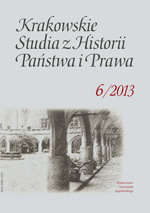Kodeks cywilny austriacki (ABGB) a wykonanie zobowiązań pieniężnych w II Rzeczypospolitej
The Austrian Civil Code (ABGB) and the performance of monetary liabilities in the Second Republic of Poland
Author(s): Robert JastrzębskiSubject(s): Law, Constitution, Jurisprudence
Published by: Wydawnictwo Uniwersytetu Jagiellońskiego
Keywords: Austrian Civil Code (ABGB); inflation; valorisation; the rebus sic stantibus clause
Summary/Abstract: The article concerns the application of the Austrian Civil Code (ABGB) in the period of the Second Republic of Poland. The paper has three sections: preliminary issues; ABGB and case law; and final conclusions. The first section refers to the application of the Austrian Civil Code during the First World War, when a dramatic drop in purchasing power of the circulating Austrian currency took place in the region of Galicia. The second section discusses the then jurisprudence, based on the Civil Code of Austria (ABGB), which displayed a valorisation trend, despite the prevailing principle of monetary nominalism. In particular, the prevalent theory of private law and, in particular, the theories of F. Zoll, had a great impact on the subsequent fate of Polish valorisation regulations after the First World War. This primarily regards the regulation of the President of the Republic dated 14 May 1924 on the recalculation of private legal obligations named after its principal designer – lex Zoll, including a subsequent regulation contained in the regulation of the President of the Republic of Poland of 27 October 1933 called the Code of Obligations, including in art. 269 the rebus sic stantibus clause. In the last section, the author draws attention to the impact of ABGB, and specifically eminent jurists from Galicia, such as E. Till, F. Zoll, and K. Przybyłowski, on subsequent regulations, including directions in theory of law – the school of “free law” (Freirecht) or the school of “free scientific exploration”. It is worth noting that modern private law arrangements introduced in the 1990s to the Polish Civil Code of 1964, in the form of a rebus sic stantibus clause, have their source in the inflationary experiences after the First World War and Polish jurisprudence based precisely on the Civil Code of Austria (ABGB).
Journal: Krakowskie Studia z Historii Państwa i Prawa
- Issue Year: 6/2013
- Issue No: 3
- Page Range: 267-276
- Page Count: 10
- Language: Polish

